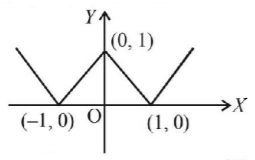111. If $$f\left( x \right) = \frac{x}{{\sqrt {x + 1} - \sqrt x }}$$ be a real-valued function then :
A
$$f\left( x \right)$$ is continuous, but $$f'\left( 0 \right)$$ does not exist
B
$$f\left( x \right)$$ is differentiable at $$x=0$$
C
$$f\left( x \right)$$ is not continuous at $$x=0$$
D
$$f\left( x \right)$$ is not differentiable at $$x=0$$
Answer :
$$f\left( x \right)$$ is differentiable at $$x=0$$
112. The function given by $$y = \left| {\left| x \right| - 1} \right|$$ is differentiable for all real numbers except the points-
A
$$\left\{ {0,\,1,\, - 1} \right\}$$
B
$$ \pm 1$$
C
$$1$$
D
$$-1$$
Answer :
$$\left\{ {0,\,1,\, - 1} \right\}$$
113.
A function $$f:R \to R$$ is defined as $$f\left( x \right) = {x^2}$$ for and for $$x \geqslant 0$$ and $$f\left( x \right) = - x$$ for $$x < 0.$$
Consider the following statements in respect of the above function :
1. The function is continuous at $$x = 0.$$
2. The function is differentiable at $$x = 0.$$
Which of the above statements is/are correct ?
A
1 only
B
2 only
C
Both 1 and 2
D
Neither 1 nor 2
Answer :
1 only
114. If $$y = \left( {1 + x} \right)\left( {1 + {x^2}} \right)\left( {1 + {x^4}} \right).....\left( {1 + {x^{{2^n}}}} \right)$$ then $$\frac{{dy}}{{dx}}$$ at $$x=0$$ is :
A
1
B
$$-1$$
C
0
D
none of these
Answer :
1
115.
Let $$f''\left( x \right)$$ be continuous at $$x = 0$$ and $$f''\left( 0 \right) = 4.$$
Then value of $$\mathop {\lim }\limits_{x \to 0} \frac{{2f\left( x \right) - 3f\left( {2x} \right) + f\left( {4x} \right)}}{{{x^2}}}$$ is :
A
$$12$$
B
$$10$$
C
$$6$$
D
$$4$$
Answer :
$$12$$
116. Let $$3f\left( x \right) - 2f\left( {\frac{1}{x}} \right) = x,$$ then $$f'\left( 2 \right)$$ is equal to :
A
$$\frac{2}{7}$$
B
$$\frac{1}{2}$$
C
$$2$$
D
$$\frac{7}{2}$$
Answer :
$$\frac{1}{2}$$
117. The number of values of $$x\, \in \left[ {0,\,2} \right]$$ at which the real function $$f\left( x \right) = \left| {x - \frac{1}{2}} \right| + \left| {x - 1} \right| + \tan \,x$$ is not finitely differentiable is :
A
2
B
3
C
1
D
0
Answer :
3
118. Let $$y = {t^{10}} + 1$$ and $$x = {t^8} + 1,$$ then $$\frac{{{d^2}y}}{{d{x^2}}}$$ is equal to :
A
$$\frac{5}{2}{t}$$
B
$$20{t^8}$$
C
$$\frac{5}{{16{t^6}}}$$
D
none of these
Answer :
$$\frac{5}{{16{t^6}}}$$
119. Suppose that $$f\left( 0 \right) = - 3$$ and $$f'\left( x \right) \leqslant 5$$ for all values of $$x.$$ Then, the largest value which $$f\left( 2 \right)$$ can attain is ____.
A
$$7$$
B
$$10$$
C
$$2$$
D
$$9$$
Answer :
$$7$$
120. If the function \[g\left( x \right) = \left\{ \begin{array}{l} k\sqrt {x + 1} ,\,\,\,0 \le x \le 3\\ mx + 2,\,\,\,3 < x \le 5 \end{array} \right.\] is differentiable, then the value of $$k+m$$ is-
A
$$\frac{{10}}{3}$$
B
$$4$$
C
$$2$$
D
$$\frac{{16}}{5}$$
Answer :
$$2$$
